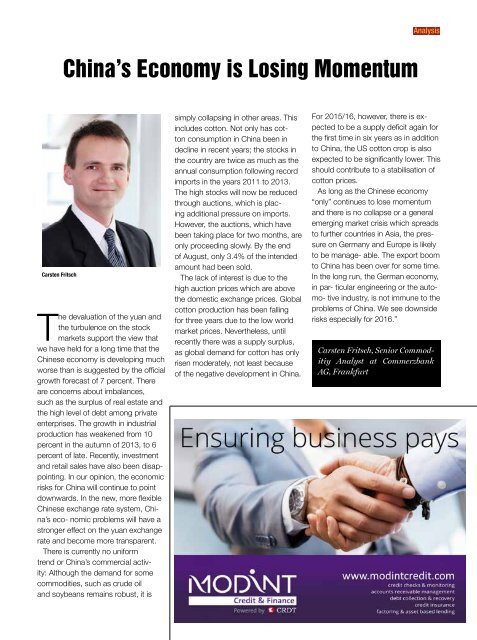You also want an ePaper? Increase the reach of your titles
YUMPU automatically turns print PDFs into web optimized ePapers that Google loves.
Analysis<br />
China’s Economy is Losing Momentum<br />
Carsten Fritsch<br />
The devaluation of the yuan and<br />
the turbulence on the stock<br />
markets support the view that<br />
we have held for a long time that the<br />
Chinese economy is developing much<br />
worse than is suggested by the official<br />
growth forecast of 7 percent. There<br />
are concerns about imbalances,<br />
such as the surplus of real estate and<br />
the high level of debt among private<br />
enterprises. The growth in industrial<br />
production has weakened from 10<br />
percent in the autumn of 2013, to 6<br />
percent of late. Recently, investment<br />
and retail sales have also been disappointing.<br />
In our opinion, the economic<br />
risks for China will continue to point<br />
downwards. In the new, more flexible<br />
Chinese exchange rate system, China’s<br />
eco- nomic problems will have a<br />
stronger effect on the yuan exchange<br />
rate and become more transparent.<br />
There is currently no uniform<br />
trend or China’s commercial activity:<br />
Although the demand for some<br />
commodities, such as crude oil<br />
and soybeans remains robust, it is<br />
simply collapsing in other areas. This<br />
includes cotton. Not only has cotton<br />
consumption in China been in<br />
decline in recent years; the stocks in<br />
the country are twice as much as the<br />
annual consumption following record<br />
imports in the years 2011 to 2013.<br />
The high stocks will now be reduced<br />
through auctions, which is placing<br />
additional pressure on imports.<br />
However, the auctions, which have<br />
been taking place for two months, are<br />
only proceeding slowly. By the end<br />
of August, only 3.4% of the intended<br />
amount had been sold.<br />
The lack of interest is due to the<br />
high auction prices which are above<br />
the domestic exchange prices. Global<br />
cotton production has been falling<br />
for three years due to the low world<br />
market prices. Nevertheless, until<br />
recently there was a supply surplus,<br />
as global demand for cotton has only<br />
risen moderately, not least because<br />
of the negative development in China.<br />
For 2015/16, however, there is expected<br />
to be a supply deficit again for<br />
the first time in six years as in addition<br />
to China, the US cotton crop is also<br />
expected to be significantly lower. This<br />
should contribute to a stabilisation of<br />
cotton prices.<br />
As long as the Chinese economy<br />
“only” continues to lose momentum<br />
and there is no collapse or a general<br />
emerging market crisis which spreads<br />
to further countries in Asia, the pressure<br />
on Germany and Europe is likely<br />
to be manage- able. The export boom<br />
to China has been over for some time.<br />
In the long run, the German economy,<br />
in par- ticular engineering or the automo-<br />
tive industry, is not immune to the<br />
problems of China. We see downside<br />
risks especially for 2016.”<br />
Carsten Fritsch, Senior Commoditiy<br />
Analyst at Commerzbank<br />
AG, Frankfurt



